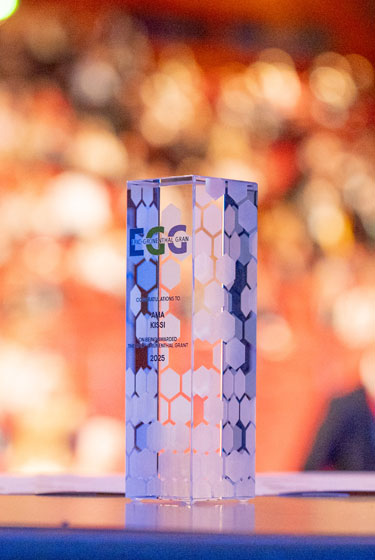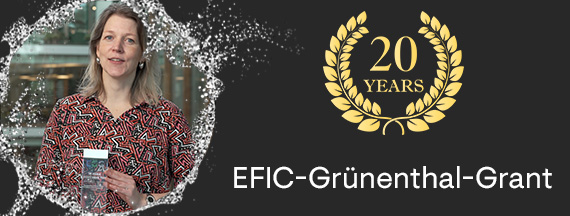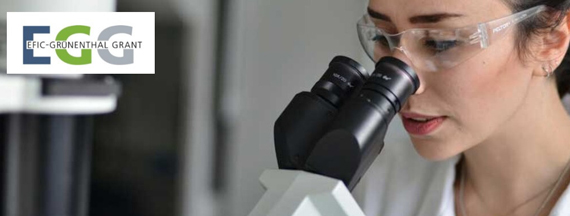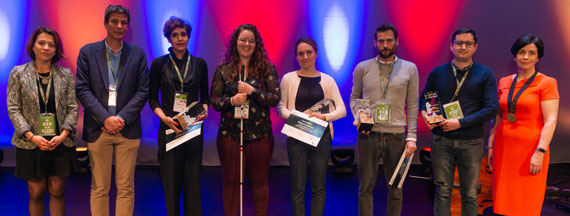
EFIC-Grünenthal-Grant (E-G-G)
For two decades, this world-leading innovation grant has funded pioneering research. It supports early-career scientists and physicians to launch their professional journeys in pain research within member countries of the European Pain Federation EFIC®.
Grünenthal provides up to €110,000 of funding for this grant each year. Individual research grants worth a maximum of €50,000 are available for projects with a duration of up to two years. These grants are allocated by a sub-group of the EFIC® Working Group for Grants and Prizes. They directly target clinical and human experimental pain research, including innovative educational initiatives that improve pain diagnosis and treatment.
KEY STATS
- Approximately € 2 million has been awarded since 2004.
- 75 projects successfully funded.
- 14 countries represented.
WHAT WE OFFER
- Funding for pioneering pain research.
- Freedom and independence for scientific projects.
- Exposure and publicity for early-career scientists.
- Networking opportunities across the pain research community.
HOW TO APPLY
Are you an early-career pain scientist? Apply for the E-G-G! The application process is fully online and all documents must be in English.
You will need:
- A research plan.
- A budget plan.
- Your CV.
- A letter of recommendation.
You can find further information on the EFIC® webpage.
MEET THE WINNERS
Get inspired by some of the people and projects that have successfully won an E-G-G grant! You will find videos and interviews in this special section…

Franziska Karl-Schöller (Germany)
Project: Innervated in vitro skin model for postherpetic neuralgia
Postherpetic neuralgia (PHN) is a chronic pain condition that occurs after a patient suffers from shingles. Currently, most research into PHN uses animal-derived models of the skin – but these models do not accurately replicate the characteristics of PHN. This project aims to develop a more human-specific model. It explores lab-grown skin that includes nerve cells, known as innervated in-vitro skin models. In this way, the project aims to provide powerful tools to deepen the understanding of PHN pathomechanisms and accelerate the discovery of new treatments.

Ama Kissi (Belgium)
Project: Unveiling Clinical Shadows: Examining the Impact of Racialised Stereotypes on Diagnostic Processes and Decisions
Pain is a common condition for all humans. However, there are significant differences in how it is experienced by different groups. For example, Black individuals often endure more intense and frequent pain than White individuals – but evidence indicates that Black people are less likely to receive adequate pain care than White people. This project will investigate how racialised stereotypes influence the type and amount of diagnostic information that healthcare providers seek when diagnosing children. In this way, it aims to make a positive impact on patients by preventing or reducing racialised inequities in pain care.

Maddalena Comini (United Kingdom)
Project: Developing an RNA-based therapy to treat neuropathic pain
Neuropathic pain has severe effects on patients’ lives. Unfortunately, current treatments mainly target the symptoms of this condition instead of the causes. This project aims to target genes involved in pain. It will test the effect of GapmeR antisense oligonucleotides (ASOs) in derived-sensory neurons (hiPSC-d SNs) that carry mutations linked to chronic neuropathic pain, and their corresponding 3D peripheral sensory organoids (hSeO). Overall, the project aims to support progress towards personalised medicines for treating neuropathic pain that are based on ribonucleic acids (RNAs).
News & Stories around our research Grant E-G-G
M-N/A-HQ-02-25-0005








